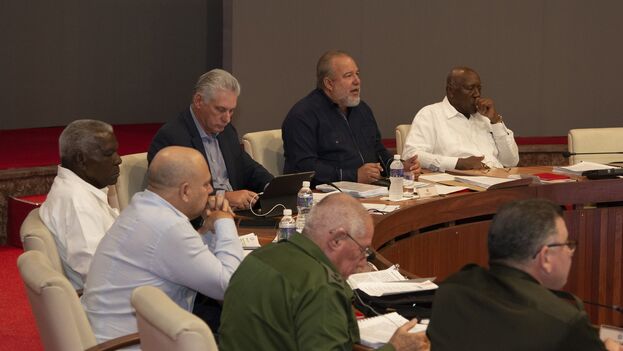
![]() 14ymedio, Havana, 28 October 2022 — The Cuban authorities have deployed 40 measures “aimed at further confrontation with crime, corruption, illegality and social indiscipline,” Prime Minister Manuel Marrero announced this Wednesday in the Council of Ministers.
14ymedio, Havana, 28 October 2022 — The Cuban authorities have deployed 40 measures “aimed at further confrontation with crime, corruption, illegality and social indiscipline,” Prime Minister Manuel Marrero announced this Wednesday in the Council of Ministers.
The plan is centered on three areas. First, the control systems for new “economic actors,” predictably the private companies. In this sense, aspects such as the increase in the imposition of fines, increase in the body of inspectors, attention to complaints from the population — predictably about prices higher than those fixed — and more supervision in the areas where marketing is concentrated are included.
The second is the study and detection of people “with marginal conduct or behavior” and “the population that is detached from study and work.” The last involves the implementation of “options for differentiated insertion” for students in vulnerable conditions.
Third, the prime minister said that there will also be measures for the state sector, allegedly increasing the accountability of the cadres, officials and public employees.
The announcement followed a dogmatic declaration by President Miguel Díaz-Canel, in which he described as “illegal, scoundrels, lumpen, lazy and corrupt” those who “do not work and do not contribute.” However, the official press highlighted the above speech about the measures, still unspecific, and other economic issues that came to light at the meeting, including the poor tourism data, well below the official objective.
The president, after talking about the corruption and abusive prices suffered by Cubans — in reference not to the state’s stores that only take payment in foreign currency, but to the black market — spoke against “those who do not work, do not contribute and engage in illegal acts, earn more and have more possibilities of living well than those who really contribute. There we are the other way around; we are breaking the concepts of socialism,” he said, later transferring responsibility to the territories “where there is no action against bad things.”
Díaz-Canel assumed that the “revolutionaries” have favored or ignored the corruption that occurs before their eyes and left aside their obligation to act, so he asked officialdom as a whole — from the Government to the mass organizations through all local and provincial ranks — to assume a leading role against this situation.
“No one has a political system like ours that can coherently face these demonstrations,” he said, after denouncing the toleration of illegal activity, which doesn’t favor anyone, and claiming that it’s not that no one has less, but that what there is must be distributed “without allowing space for roguery and abuse.”
The leader added that most people cannot buy with black market prices and that those who can are engaged in the same thing. “We have created a caste in which there is an illegal and corrupt commercial exchange, with an underground and illegal economy. And that’s socialism, that’s what we want? Is that what causes development? No, it’s not,” he maintained.
Díaz-Canel recalled as an example last week’s operation at the bottom of the bridge of 100th and Boyeros in Havana and accused young people of being responsible for most of these criminal acts. “The Revolution was not made for that and has given every opportunity for young people to study and work,” he said, in the midst of a wave of young adults who leave the country for lack of a future, including many sports stars, artists and even official journalists.
In addition, the president defended the tax system in Cuba, which isn’t for the rich to be richer, but so that “those who have more give up a share and those who have less are better off,” a principle that, in his opinion, “is not doing well.” The comment, striking in a country that allegedly experienced a revolution to abolish social classes, can also be understood as a self-criticism, if really the distribution of the State’s income — practically unknown, due to the lack of detail about the budgets — is not adequate.
In his allegation, Díaz-Canel also emphasized the difference between a vulnerable person and one who does not want to work; the latter, he insisted, cannot receive from the State without contributing. “Assistance won’t help; you have to provide someone with a job to improve living conditions. These things must be changed now. We have to, little by little, with conviction, explanation, argumentation, adequate government and public policies, regulate all those elements, because otherwise society is disordered, and we don’t move forward,” he said.
The Council of Ministers also reviewed elements of the agenda such as the export balance, which grew by 108% in September, highlighting honey, mechanized tobacco, rum, lobster and nickel. Globally, Cuba continues to import much more than it exports, $8.431 billion for purchases abroad and just $1.966 billion for sales in 2021. Road safety, the approval of upcoming rules – including the Mediation of Conflicts – and the portfolio of businesses that will be presented at the next Havana International Fair were also discussed.
Translated by Regina Anavy
____________
COLLABORATE WITH OUR WORK: The 14ymedio team is committed to practicing serious journalism that reflects Cuba’s reality in all its depth. Thank you for joining us on this long journey. We invite you to continue supporting us by becoming a member of 14ymedio now. Together we can continue transforming journalism in Cuba.
